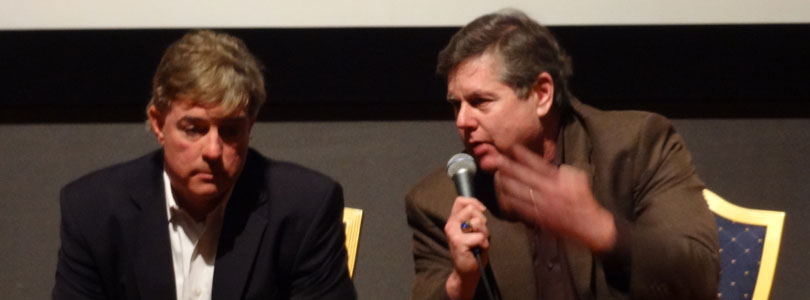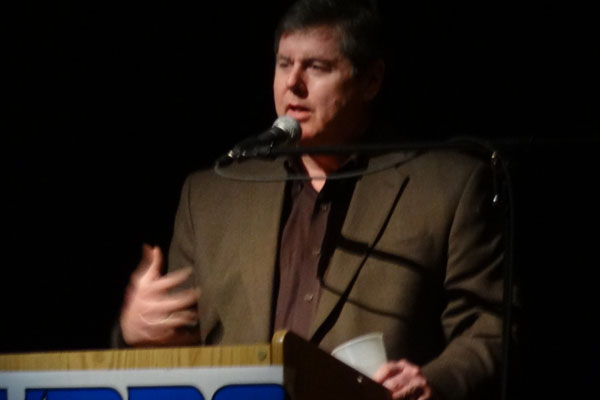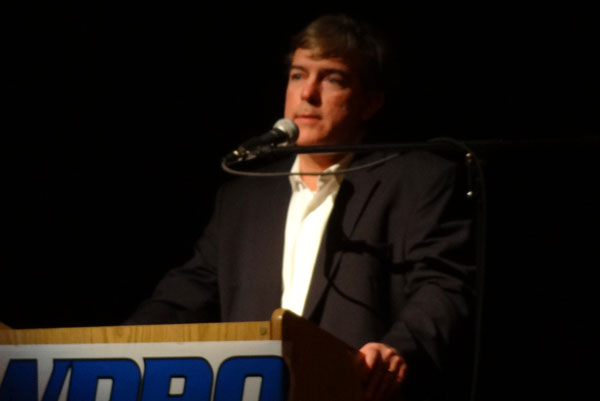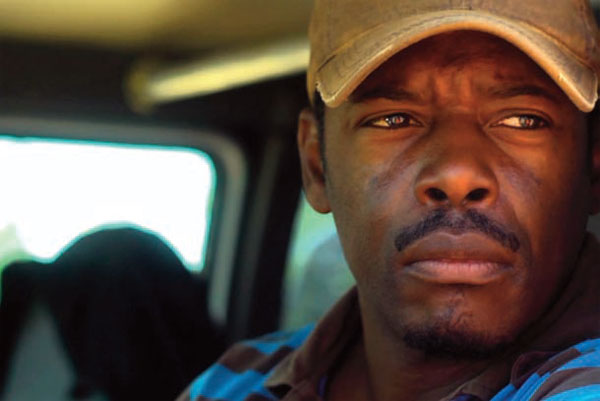Laffey Movie Catches Mood, but That Might Be a Different Kind of Success than Hoped For
In what must have felt a bit like the fulfillment of a childhood dream, former Cranston Mayor and Senatorial Candidate Stephen Laffey premiered his movie Fixing America at the beautiful hometown Park Theater to a surprisingly small audience of WPRO listeners. According to WPRO Promotions and Marketing Director Rebekah Berger, the limited audience of contest winners was meant to create an “intimate” atmosphere; as talk-show host Dan Yorke put it during his introduction, the mood was almost like a “private viewing.” That, in itself, is surprising, given Laffey’s very public profile when he was locally active.
If the crowd was smaller than expected, the movie itself, well, that was better than expected. I don’t intend that to imply what it probably does. The truth is that I didn’t know what to expect, but suspicion would be wise for any audience of a former politician’s film. Laffey gave his movie an opportunity to be good by very tastefully not making it an overt promotional vessel for himself. Through most of the movie, he lets his subjects do the talking, and that’s where the real rewards appear.
Don’t get me wrong. Part of the fun of Laffey-watching is trying to figure out what he’s up to — what next rung he’s reaching for — and the movie can’t help but insinuate hints. Even the fact that there is a movie does that. But except for the ending, when the former mayor returns to Rhode Island and too dramatically steps in front of the camera, not as the interviewer, but as the interviewee for local TV reporters and orator at an Operation Clean Government event, the movie is a parade of facts, figures, and people. Just people you might know, even though they live thousands of miles away.
One camera shot illustrates exactly what I mean: Of the people whom Laffey’s crew interviews on streets across the nation, one was standing in downtown Bennington, Vermont, where my mother grew up and where I spent many summers as a boy. The man was unfamiliar, but shortly after his interview, the camera pans past scenery of a road along a valley in front of a mountain. It’s not a very dramatic mountain, by Vermont standards, little more than a glorified hill, but I’m pretty sure the camera is in just about the precise spot that I was when I took a picture driving through the area on my honeymoon nearly fourteen years ago. That’s how familiar these settings and these people are.
Laffey’s greatest success, with Fixing America, might even be unintentional. At times, it felt like a tumble of issues that are somewhat related but not unified, for the sake of the plot, with adequate transitions. As a political statement, it can be difficult to follow. It starts out talking about the national debt, and indeed, the related Web site’s tag line is, “Fixing America – A National Debt Movie By Steve Laffey.” But then it’s about joblessness. Then China. Then transparency. Then the replacement of “church and state” with “business and state.” American religiosity is in there. Family values get a mention.
Clearly, a thread can be pulled through all of these topics, but the movie doesn’t really do it. When a documentary like this doesn’t connect the dots, audiences are apt to infer things that aren’t there. For instance, the Q&A following the screening kicked off with somebody calling for a boycott of Walmart, but a quick, harsh rebuttal from within the audience, followed by a much softer one from Mr. Laffey on the stage, noted that such an initiative would miss the point and harm the people whom the movie celebrates.
In part, the difficulty, here, is that such a thread is the subject of a lifetime of deep thinking and long tomes, not an hour-and-a-half collection of quotations. And in part, it results from the fact that Laffey withdrew from the spotlight for much of the movie, and by leaving people on the street to do the talking, he allows them to jumble the message.
That’s where the movie is really good. It will read like pat political labeling, but if the movie is about something, I’d say it’s about the Tea Party. Like an impressionistic painting is about a waterfall. It’s not quite angry, or despondent, or interested in individual blame, or ideological. If anything, it’s mildly incoherent. The sense is absolutely coherent, though, that something is wrong, and that something is preventing the United States from doing what it does best — fixing itself.
For that reason, the star of the entire movie is Larry Walker, from Poplar Grove, Arkansas.
Poplar is a green-tinted, sometimes knotty, wood that substitutes well for pine. It’s a bit harder and more stable, though, so woodworkers also use it in some applications that typically call for harder woods, like maple or oak. A novelist would be hard pressed, therefore, to place Larry’s quintessentially American commentary in a better setting than Poplar Grove:
I saw my father, as a young boy, every year, year after year, getting up early in the morning going to work for somebody else. And then there’s no promises for the future. So, I decided, if I’m going to work for someone and not bein’ able to have anything to be able to pass on a job or even a job to go to as years go on and be able to pay my bills. So, at least if I sit at the table by myself, then I’ll know what I bring in. Just work for myself.
… You ride by and look at some of these beautiful homes at night, you only see one light burning, and that’s in the bedroom. A lot of people ain’t sleeping at night. It’s rough. It’s rough everywhere. You know, the rich and the poor. And in between, I don’t know if there’s a middle class. I just know that it’s a lot of suffering people in every situation, but it seems like the only ones that doesn’t have any problems is the politicians. …
There’s nothing I could say to them that they don’t already know. We just need someone to speak with them to just do right. Just do justice for all. The country that they claim they love, then they need to show their love and not just talk it. This thing goes back. Politics are so messed up on us. While we’re out here fighting and scrapping, you know, fighting each other and scrapping while they’re behind closed doors hugging and kissing each other and cutting deals and cutting us out.
Yes, one could debate with Larry from the left or from the right, but most would agree that his underlying sentiment is inarguable. Americans need to be cut in; they need cards in their hands. Some are wealthy, and some are not. Some are substance abusers (whom Larry cites in an expanded quotation), and some are scrappers. But we’ll work that out… if we’re given the space to work it out.
In the final analysis, that may be the core message of Fixing America. As Mr. Laffey emphasized after the credits had rolled and the lights come on, he doesn’t have the answers. He’s conveyed America’s contradictory and garbled, yet somehow completely clear, message, and the next step isn’t to figure it all out, but to demand the opportunity to give it a try.
Fixing America will be shown again at the Park Theater in Cranston again tonight and tomorrow night, both showings at 7:00 p.m.






